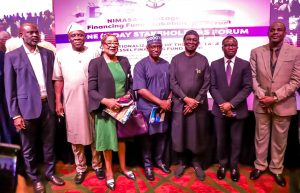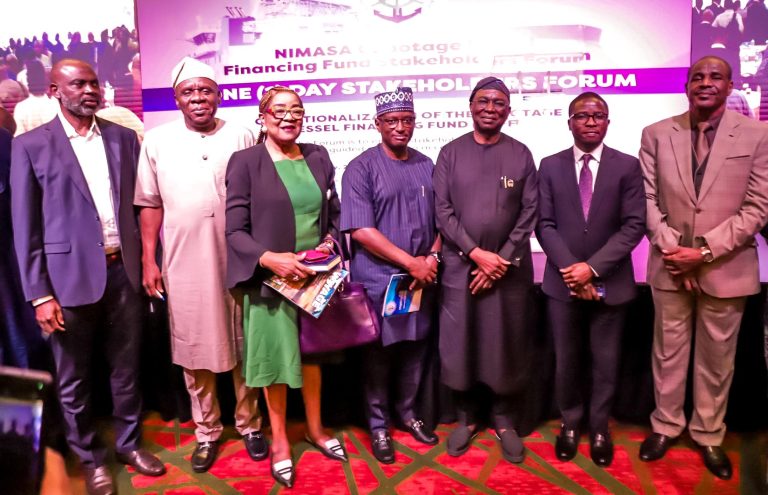…As Buhari receives report on AfCFTA, explains why Nigeria won’t rush to sign***
The Federal Account Allocation Committee (FAAC) shared N679.69 billion on Thursday, among the Federal Government, States and Local Government Councils, as federal allocation for the month of May.
A statement by Mr. Hassan Dodo, the Director, Information, Ministry of Finance, said the allocation was shared at FAAC’s joint session at the African House, Kano State.
Dodo said that a communiqué issued by the Technical Sub-Committee gave the breakdown of the distribution to the three tiers of government.
According to him, it is inclusive of cost of collection to the Nigeria Customs Service (NCS), Department of Petroleum Resources (DPR) and the Federal Inland Revenue Service (FIRS).
He said the total revenue distributable for the month included Value Added Tax (VAT) of N106.82 billion and Exchange Gain of N1.14 billion.
Dodo said that the Federal Government received N284.16 billion, representing 52.68 per cent, the states received N187.6 billion, representing 26.72 per cent and LGCs got N140.99 billion, representing 20.60 per cent.
He added that the oil producing states received N40.43 billion as 13 per cent derivation revenue.
Dodo, however, said that cost of collection/transfers/FIRS refund stood at N26.498 billion.
He also said that the communiqué indicated that the gross revenue available from VAT was N10.34 billion more than the N96.48 billion distributed in April.
It further disclosed that the distributed statutory gross revenue of N571.73 billion received for the month was higher than the N518.91 billion received in the previous month by N52.81 billion.
According to the communiqué, revenues from Oil Royalty and Companies Income Tax (CIT) recorded significant increases, while Petroleum Profit Tax (PPT) decreased significantly.
“Meanwhile, Import Duty and VAT also recorded marginal increases.’’
Dodo said that the committee disclosed that as at Thursday, the Excess Crude Account (ECA) had a balance of 63 million dollars.
In the meantime, President Muhammadu Buhari on Thursday in Abuja received the report on the impact of the African Continental Free Trade Area (AfCFTA) and Nigeria’s readiness for it.
The African Union Heads of States had on March 21, 2018 adopted the Phase I Agreement on the AfCFTA at its 10th Extraordinary Summit in Kigali, Rwanda.
President Buhari, however, observed the AfCFTA will have both positive and negative effects on Nigeria as a nation and the West African sub-region.
He said: “A lot has been said about Nigeria’s decision to conduct a detailed study on how this agreement will impact us as a country.
“Let me state unequivocally that trade is important for us as a nation and to all nations. Economic progress is what makes the world go around.
“Our position is very simple, we support free trade as long as it is fair and conducted on an equitable basis.
The AfCFTA will have both positive and negative effects on us as a nation and on our region.
“As Africa’s largest economy and most populous country, we cannot afford to rush into such agreements without full and proper consultation with all stakeholders.’’
The president maintained that for AfCFTA to succeed, African nations must develop policies that promote African production, among other benefits.
“Africa, therefore, needs not only a trade policy but also a continental manufacturing agenda. Our vision for intra-African trade is for the free movement of “made in Africa goods”.
“That is, goods and services made locally with dominant African content in terms of raw materials and value addition.
“If we allow unbridled imports to continue, it will dominate our trade. The implication of this, is that coastal importing nations will prosper while landlocked nations will continue to suffer and depend on aid,’’ he added.
President Buhari, therefore, stressed the need to always ensure that all negotiated agreements create business opportunities for Africa’s manufacturers, service providers and innovators.
“The AfCFTA we aspire to have should therefore not only create wealth for investors but also jobs and prosperity for our vibrant and hardworking citizens. The benefits of economic growth must be prosperity for the masses.
“I am very delighted to receive your report today and with the time spent, skills applied and energy invested, I am confident that the Committee has been thorough and diligent,’’ he said.
While thanking members of the committee, the president assured that the report would form part of the consideration in the nation decision on the next steps on the AfCFTA in particular and on broader trade integration subjects.
“Let me congratulate all members of the Committee for the work done. I thank all stakeholders and organizations including our development partners that provided support to the Committee in one form or another,’’ he added.
Speaking while submitting the report, the chairman of the presidential committee, Mr Desmond Guobadia, disclosed that the Committee reviewed over 200 submissions from various stakeholders across the country including farmers, bankers, manufacturers, government agencies and development partners.
He said the committee recommended that Nigeria should consider joining the AfCFTA and using the opportunity of the ongoing AfCFTA Phase I negotiations to secure the necessary safeguards required to ensure that the nation domestic policies and programmes are not compromised.


















